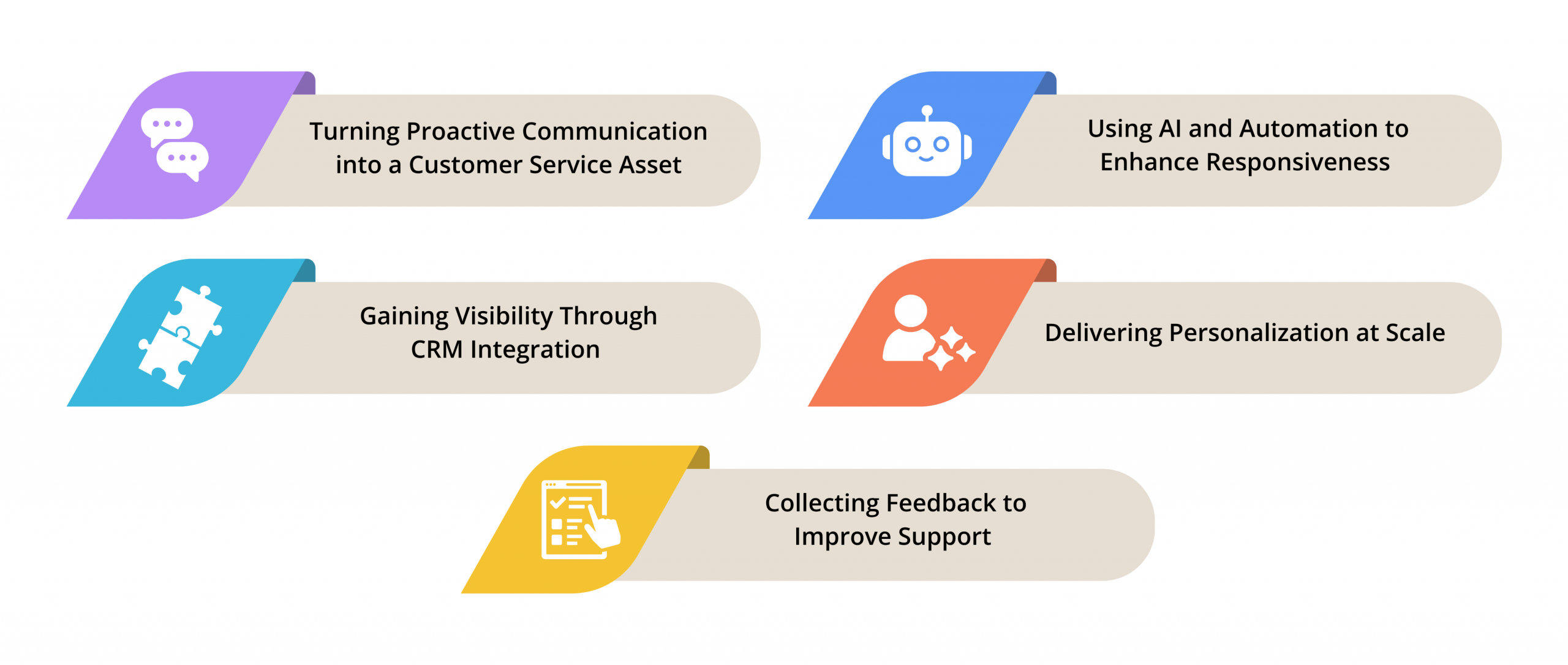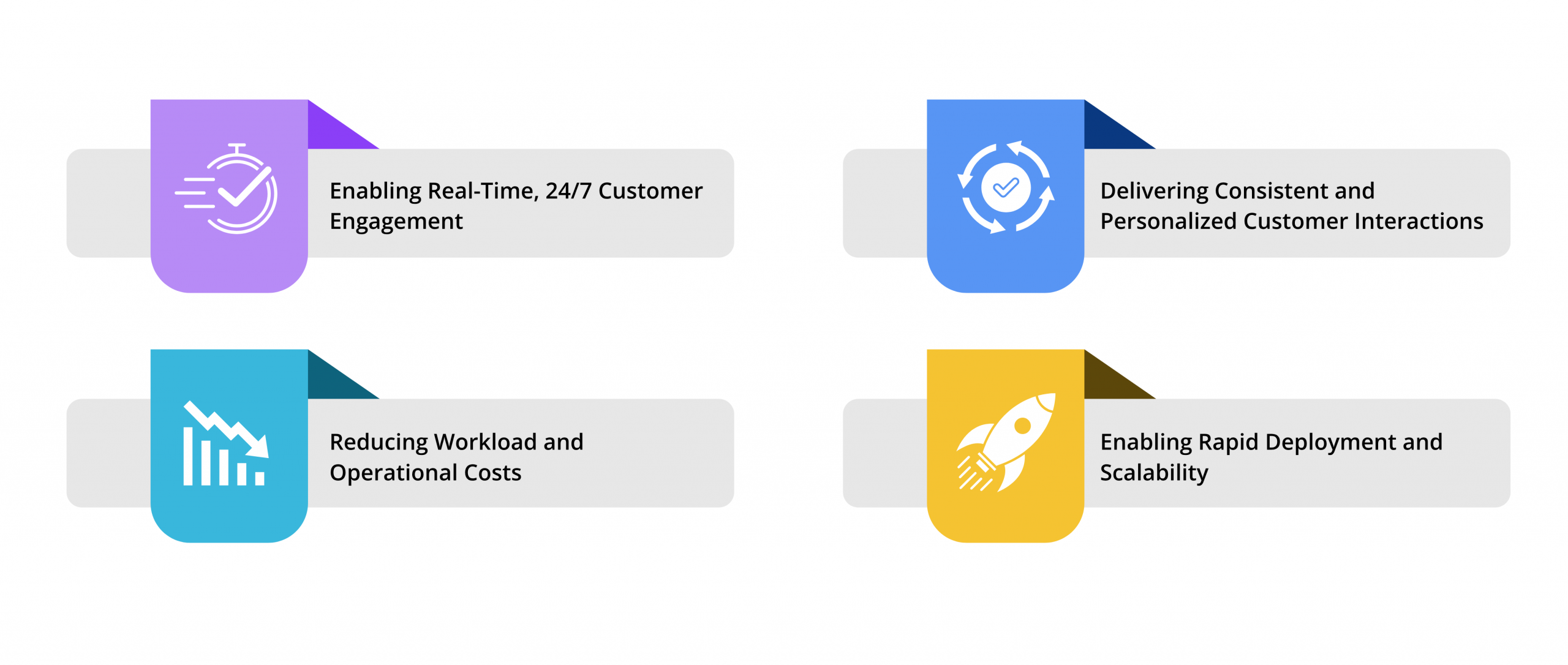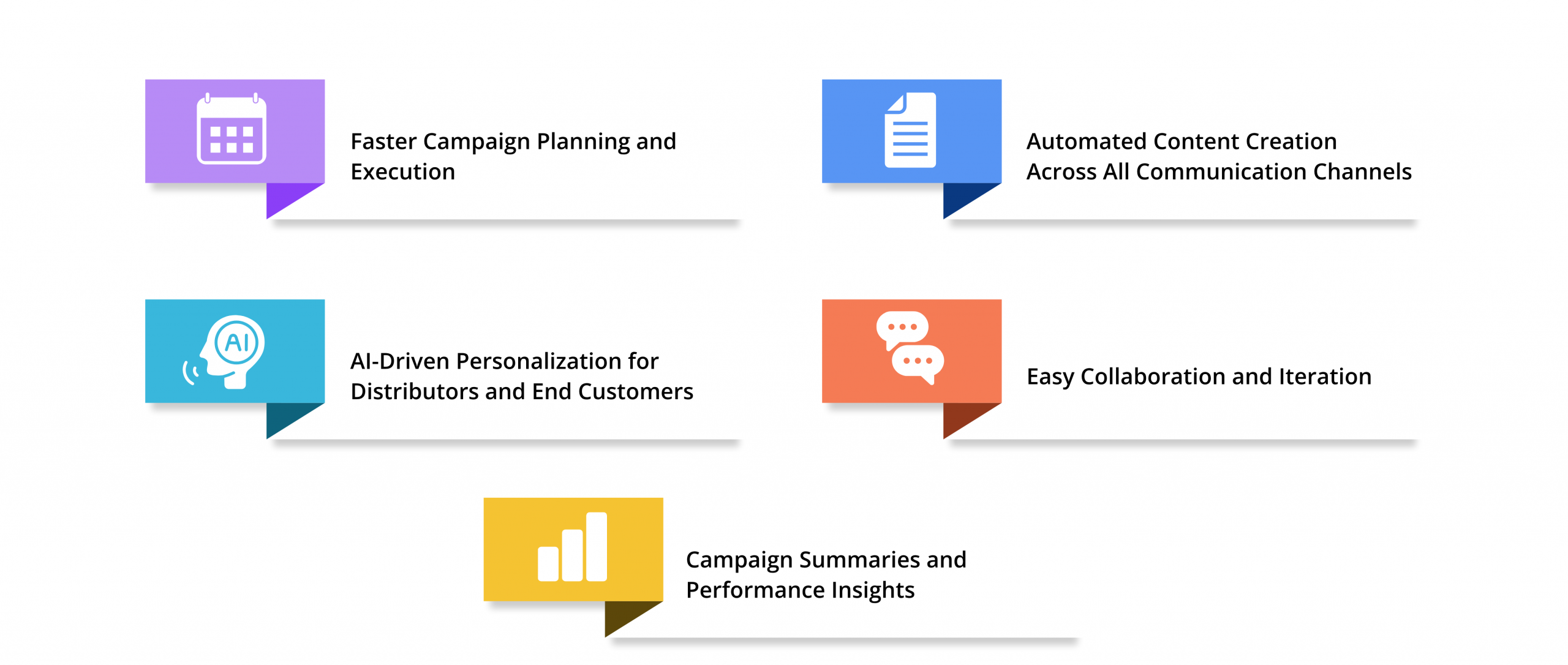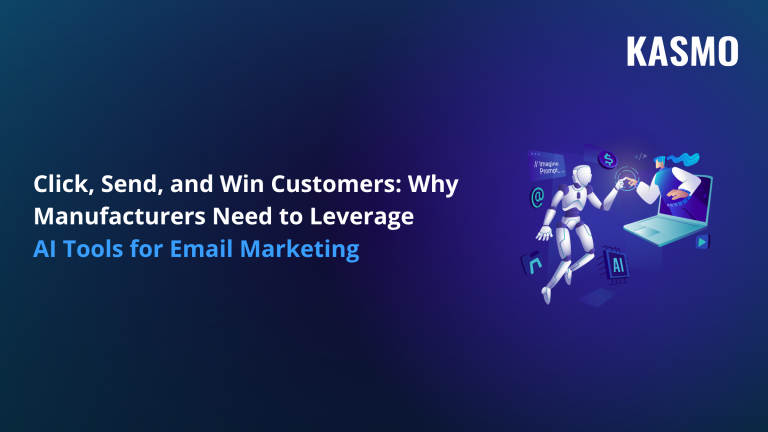How Manufacturers Can Leverage Email Marketing to Solve Problems with Customer Service?
Due to increasing customer demands, inventory management challenges, and supply chain challenges, manufacturers are finding it difficult to seamlessly eliminate the challenges manufacturers face with customer service. As personalization and efficiency are key to retaining customers, manufacturers can leverage AI tools for marketing to prevent customer churn and deliver hyper-personalized services.
Manufacturing companies need to understand that irrespective of their business model and goals, marketing is a key aspect, and it should not be ignored. Manufacturers may think that they need to spend hours and a significant number of resources to establish good marketing practices. But that is far from the truth!
Email marketing is one of the oldest forms of marketing. It is true that, year-on-year, email marketing practices have transformed to keep up with customers and technology. Like before, batch and blast will not make your customers loyal to your brand. Even for manufacturing companies, customer loyalty is of the outmost importance. If you want to take a proactive approach to solving your customer service challenges through email marketing, you need to leverage Agentforce, one of the best AI tools for email marketing.
As emails remain a core communication channel, manufacturing companies are often burdened by slow response times, high volume of inquiries, and impersonal interactions. However, integrating email marketing with AI helps manufacturers transform these challenges into opportunities and provide better proactive service, improved operational efficiency, and enhanced customer satisfaction.

Turning Proactive Communication into a Customer Service Asset
Integrating email marketing with AI supports your customer service teams by reducing the overall volume of inbound support emails through proactive communication. Instead of waiting for customers to reach out with issues or questions, manufacturers can send timely updates and information that satisfy those concerns. For example, by sending order confirmations, shipment tracking details, warranty registration instructions, or even recall alerts, customers are kept informed and feel reassured throughout their journey.
Additionally, sharing educational content such as maintenance guides, setup instructions, and a “how to use” manual can be sent immediately after purchase to prevent common issues from occurring in the first place. This shift from reactive to proactive communication reduces the number of inquiries customer service teams must handle, improving the customers’ experience.
Using AI and Automation to Enhance Responsiveness
Speed and responsiveness are also common issues in traditional email marketing. AI tools for email marketing offer automation features that help manufacturers address customer needs more quickly. By implementing automated workflows, manufacturers can instantly acknowledge customer inquiries and direct them to provide helpful resources while a support rep is assigned.
For instance, if a customer emails about a missing manual, an automatic response can include a direct link to the relevant product documentation. These smart automations help set expectations and provide immediate assistance, reducing customer frustration and empowering your customer support teams.
Gaining Visibility Through CRM Integration
Another common challenge in email marketing is the lack of visibility into customer information, which slows down response times and often leads to repetitive back-and-forth communication. When manufacturers integrate Salesforce CRM with their email marketing platform, they gain the ability to personalize emails based on real-time data such as purchase history, product type, service status, or location.
As a result, customer emails can be addressed with greater accuracy and relevance. For example, if a customer asks about a part replacement, the support team can automatically access details about the specific model and purchase date, avoiding unnecessary clarification emails, streamlining customer service.
Delivering Personalization at Scale
Email marketing also addresses the issue of impersonality in high-volume environments (where businesses need to cater to multiple customers at the same time). Instead of sending generic, templated responses, manufacturers can deliver tailored content based on customer engagement with the brand. Dynamic and personalized email content can be adjusted according to product category, industry, or even the customer’s behavior on the website.
For example, a customer who recently browsed a troubleshooting article could receive a follow-up email with additional how-to resources or video tutorials. This level of personalization helps build stronger relationships and ensures customers feel valued, even in automated interactions.
Collecting Feedback to Improve Support
Email marketing provides a valuable opportunity for manufacturing companies to gather customer feedback and continually improve their service experience. After a support interaction, manufacturers can send follow-up emails that ask for feedback or customer satisfaction ratings. This not only helps companies measure the effectiveness of their support teams but also showcases customers that their opinions are valued. The insights gathered through these feedback loops can be used to update knowledge bases, train customer support teams, refine messaging, and improve both products and services.
Navigating the Maze: Addressing the Biggest Challenges in Manufacturing Today
How AI Tools for Email Marketing Can Help Manufacturers Enhance Customer Service
As manufacturers navigate increasing customer expectations, complex product inquiries, and high service workloads, email marketing remains a preferred communication channel. AI tools for email marketing help manufacturing companies overcome problems with customer service and enhance customer engagement.

Enabling Real-Time, 24/7 Customer Engagement
One of the core strengths of leveraging AI tools in email marketing is their ability to support real-time, round-the-clock communication. Unlike human agents, where customers often wait hours or even days for a response, AI-powered systems can analyze incoming emails instantly, categorize them, and provide immediate replies.
These tools can address frequently asked questions, such as order status, product specifications, or warranty coverage without human intervention, ensuring faster resolutions and reducing customer frustration. For manufacturers with global operations and distributed customers, this 24/7 availability ensures that customer concerns are acknowledged and addressed promptly, regardless of time zone.
Delivering Consistent and Personalized Customer Interactions
Integrating email marketing with AI helps manufacturers go beyond just simply responding to customers. With access to integrated data sources like CRMs, ERPs, and past customer interactions, they can generate personalized, accurate responses that reflect the customer’s history, preferences, and current engagement with service reps.
For instance, when a long-time client asks about spare parts for a specific model, the AI tool or agent can automatically reference their purchase history and recommend the right components. This level of personalization builds trust and demonstrates that businesses are paying attention to their customers.
Reducing Workload and Operational Costs
By automating routine email inquiries, AI agents reduce the workload on service reps, allowing them to focus on complex customer service challenges and tailor interactions that require human expertise. This eliminated the need for manufacturers to hire resources during peak periods and reduce their expenses. This results in a more cost-effective support structure, where resources are allocated based on complexity and priority. Additionally, AI tools can flag emails that need human intervention and seamlessly escalate them to the appropriate customer service rep, ensuring that every customer is attended to.
Enabling Rapid Deployment and Scalability
AI tools for email marketing are designed for quick implementation. Manufacturers can integrate these tools with platforms, such as Salesforce, using low-code or no-code options. Pre-built templates tailored to customer service workflows enable teams to start seeing results in days, not months. This is ideal for manufacturers with dynamic product lines or changing customer expectations.
Email Marketing Trends Manufacturers Can Use in 2025
As the manufacturing industry becomes more digitally connected and customer-centric, traditional email marketing methods alone are no longer sufficient. Here are the top email marketing trends they should leverage:
Interactive Emails for Streamlined B2B Engagement
Static email messages are being replaced by interactive emails that offer website-like functionality directly in the inbox. Manufacturers can add elements like product details, quote request forms, or order trackers inside emails, enabling faster customer actions and shorter sales cycle.
For example, instead of linking customers to an external form to schedule a demo, embed a calendar right inside the email. This approach improves the user experience and increases conversion rates, ideal for B2B customers who prefer efficiency.
Prioritizing Data Privacy and Compliance
With heightened awareness of data privacy and global regulations like GDPR, manufacturers must ensure they collect and manage data ethically. In 2025, customers are more aware of sharing their customer data. Manufacturers should be transparent to their customers on why they want to collect customer data. Making customers aware of how the company is going to leverage the data increases trust, which increases customer loyalty. Manufacturing companies should tailor their email campaigns to include unsubscribe options, respect privacy preferences, and avoid over-personalization that feels intrusive.
Hyper-Personalization Based on Buyer Roles and Industries
Batch and blast emails won’t cut it in 2025. In the manufacturing industry, hyper-personalization allows manufacturers to tailor messages using behavioral data, CRM, or product usage patterns. For example, manufacturers can send product specification sheets to engineers, while procurement officers receive cost-benefit analyses through emails, by leveraging AI tools or agents.
AI-Driven Campaign Optimization
AI is redefining how manufacturers plan, execute, and optimize their email marketing campaigns. AI tools can generate subject lines, write content variations, and predict the best times to send emails, improving customer service. By integrating email marketing with AI, manufacturers can analyze which types of content drive engagement across different industries or buyer stages, helping them fine-tune their messaging.
Customer Engagement with a Human Touch – Hyper-personalization Using Salesforce Marketing Cloud
Benefits Manufacturers can Gain by Leveraging Agentforce in Manufacturing Cloud
As manufacturers work to digitalize manufacturing operations, improve customer engagement, and streamline complex sales cycles, leveraging AI tools for email marketing is crucial. Salesforce’s Agentforce, when integrated within the Manufacturing Cloud, it helps manufacturers accelerate creating email marketing campaigns and drive smarter, more effective communications across partners, customers, and sales teams. Here are the key benefits manufacturers can gain by using Agentforce in Manufacturing Cloud:

Faster Campaign Planning and Execution
Manufacturers often juggle multiple product lines, distributor relationships, and long sales cycles. Agentforce helps cut down the time and manual effort needed to launch go-to-market campaigns. By simply describing the campaign, such as a product launch for a new machine or an upcoming distributor event, Agentforce’s AI agents can instantly draft a comprehensive campaign brief, including the campaign name, audience profile (e.g., industrial buyers, resellers), key message, and business objectives. This reduces the time spent on planning, allowing manufacturers to focus more on customer engagement and increasing ROI.
Automated Content Creation Across All Communication Channels
Once the campaign brief is generated, Agentforce can create channel-specific content, from emails to landing pages and even SMS messages. For instance, if a manufacturer is promoting a new equipment upgrade program to its dealer network, Agentforce can instantly generate:
- A preview email with personalized subject lines and body text
- A landing page to collect lead interest
- SMS follow-ups to reinforce event reminders or promotions
AI-Driven Personalization for Distributors and End Customers
Agentforce uses brand guidelines, customer data, and historical campaign performance to generate tailored content for specific customer segments. For manufacturers, this means sending a customized campaign to different stakeholders, e.g., resellers, end-users, or maintenance teams with messaging that aligns with their role and business needs.
You can even prompt Agentforce to draft content for a specific customer type, like: “Create a campaign targeting logistics managers at auto parts warehouses who’ve purchased in the last 6 months.” This level of personalization increases customer satisfaction, boosts engagement, and shortens the sales cycle.
Easy Collaboration and Iteration
Agentforce allows marketing and sales teams in manufacturing companies to collaborate more effectively on creating campaign content. Users can revise AI-generated drafts, adjust tone and length, or refine the message based on real-time feedback from sales or product teams. Manufacturers with distributed teams across multiple locations can iterate quickly and maintain brand consistency across regions, languages, or distribution networks.
Campaign Summaries and Performance Insights
After the AI agents help manufacturers deploy tailored campaigns to their target audience, Agentforce automatically generates a summary report, including open rates, click-through rates, and delivery metrics. For manufacturers, this visibility is crucial in understanding what’s working, and what’s not, across various product lines or geographic markets. With this feedback loop, teams can optimize future marketing campaigns based on actual performance data and AI insights, improving both efficiency and outcomes over time.
Interested in enhancing your customer service and shortening the sales cycle by leveraging Agentforce? Get in Touch!
Conclusion
Manufacturers relying on outdated email marketing practices can hinder growth and impact customer satisfaction. By leveraging AI tools for email marketing, manufacturers can overcome traditional email marketing challenges, improve responsiveness, deliver hyper-personalized experiences, and resolve complex problems with customer service.
With platforms like Agentforce, manufacturers can simplify email marketing campaigns, scale communications across channels, and provide timely, relevant content to distributors, partners, and end users. Integrating email marketing with AI agents helps manufacturers get real-time customer engagement and deliver tailored email campaigns to customers, partners, and stakeholders.


